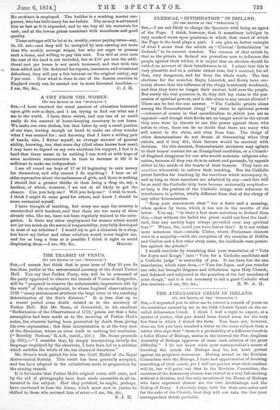CLERICAL " INTIMIDATION " IN IRELAND.
(TO THE EDITOR OF THE " seurrAroa.1 SIR,-I am not likely to charge the Spectator with being an agent of the Pope. I think, however, that it sometimes indulges in very crooked views upon questions in which that creed of which the Pope is the head plays a part. I can give no better example of what I mean than the article on " Clerical Intimidation' in Ireland," in its current number. The essence of that article is, that as the priests in Ireland are powerless now to influence the people against their wishes, it is unjust that an election should be voided on account of their interference in it. I admit that this is very plausible and to a certain extent true, but I contend, for all that, very dangerous, and far from the whole truth. The late elections for the counties Mayo, Limerick, and Kerry have cer- tainly shown that the influence of the clergy is seriously weakened, and that they have no longer their ancient hold over the people. But surely the real question is, do they still lay claim to the pos- session of spiritual powers, and is this claim to any extent allowed ? There can be but the one answer. " The Catholic priests alone among the Nonconformist clergy" lay claim to spiritual powers —inherent of course in that sacerdotalism to ,which you are so opposed—and though their flocks are no longer awed to the extent they once were by threats to use this power against those who refuse to obey, there can be no doubt that there are many who still assent to the claim, and obey from fear. The clergy of other denominations do not dream of threatening when they exhort, and if they did, their threats would be received with derision. On this account, Nonconformist ministers may agitate to their hearts' content for an Evangelical candidate, or a Church- of-England clergyman for one who would maintain religious edu- cation, because all they can do is to exhort and persuade, by appeals either to the minds or the hearts of their hearers. They have no sanctions wherewith to enforce their teaching. But the Catholic priest fortifies his teaching by the sanctions which accompany it, and as long as these sanctions are admitted by any—and this will be so until the Catholic laity have become universally sceptical— so long is the position of the Catholic clergy, with reference to interference in politics, wholly different from that of the clergy of
any other denomination. •
"Keep your consciences clear" has a force and a meaning, when spoken by them, which it has not in the mouths of the latter. You say, "Is there a fact more notorious in Ireland than this, —that without the ballot the priest could not beat the land- lord, that any earthly hope always prevailed over any spiritual fear ?" Where, Sir, could you have learnt this ? Is it not rather more notorious that—outside Ulster, where Protestant electors were in a majority—with the exception of the counties of Dublin and Carlow and a few other stray seats, the landlords were power- less against the priests ?
I would conclude by remarking that your translation of " Vote for Joyce and Keogh " into " Vote for a Catholic candidate and a Catholic judge" is unworthy of you. It can have but the one translation, which runs thus,—" Vote for Joyce, and you vote for one who has brought disgrace and tribulation upon Holy Church, and defamed and subjected to the penalties of the law members of your clergy," and it is not necessary to tell a good Catholic what


































 Previous page
Previous page